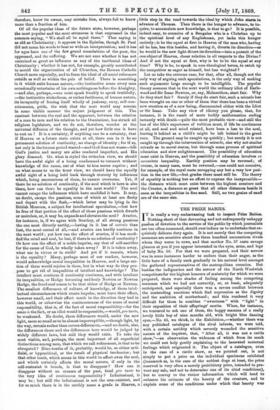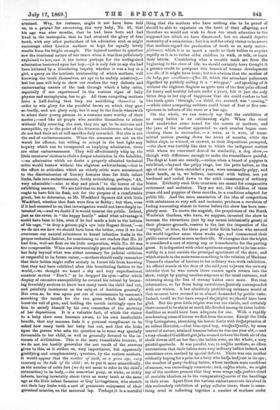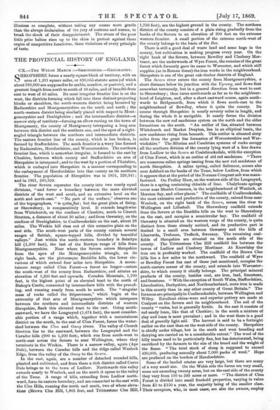THE PRIZE BABIES.
IT is really a very embarrassing task to inspect Prize Babies. Nothing short of that devouring and not unfrequently unhappy pasilon of devotion to the service of the public by which journalists are too often consumed, should ever induce us to undertake that ex- quisitely delicate duty again. It is not merely that the competing mammas are sensitive about the three hundred unconscious rivals whom they nurse in rows, and that mother No. 57 casts savage glances at you if you appear interested in the eyes, arms, and legs of baby No. 56. For that we were prepared, and their sorrow was in some instances harder to endure than their anger, as the little hero of a family sank gradually to his natural level amongst the gathered representatives of the metropolitan counties. But besides the indignation and the sorrow of the North Woolwich competitors for the highest honours of maternity for which we were prepared, there were shades of feeling among the competing mammas which we had not correctly, or, at least, adequately anticipated, and especially there was a severe conflict between the contending emotions which find expression as the dignity and the ambition of motherhood ; and this rendered it very difficult for them to combine " sweetness " with " light " in their exposition of their offsprings' merits. When, for instance, we ventured to ask one of them, the happy mamma of a really lovely little boy of nine months old, with bright blue dancing eyes,—No. 46, we think, in the Exhibition,—whether there was any published catalogue of the rival infanta, we were told, with a certain acridity which severely wounded the sensitive nature of the inquirer, that, "After all, it was not a cattle show,"—an observation the wideness of which from its mark we could not help gently explaining to the lacerated maternal feelings which originated it. The object of a catalogue, even in the case of a cattle show, as we pointed out, is not simply to put a price on the individual specimens exhibited (inasmuch as, in the case of the noblest dogs at least, the price reserved is very often a merely prohibitory price, intended to pre- vent any sale, and not to determine one of its chief conditions), but to convey to the visitor information which will tend to enhance his estimate of the beauty of the creature, and to explain some of the conditions under which that beauty was attained. Why, for instance, might it not have been told us, in a printed list concerning this very baby, No. 46, that his age was nine months, that he had been born and had lived in the metropolis, that he had attained the glory of four teeth, with any other particulars of his education such as might encourage other London mothers to hope for equally lovely results from his bright example. The injured mother in question saw the irrational nature of her taunt when it was thus judiciously explained to her, saw it the better perhaps for the undisguised admiration bestowed upon her boy,—(it is only fair to say she had been irritated by a blundering inquiry whether it was a boy or a girl, a query on the intrinsic irrationality of which mothers, well knowing the truth themselves, are apt to be unduly sensitive),— but her case will help to show our readers the very delicate and embarrassing nature of the task through which a baby critic, especially if not experienced in the various signs of baby physics and metaphysics, has to go. All these competing mothers have a half-feeling that they are sacrificing themselves in order to win glory for the youthful brows on which they gaze so fondly, and not glory only, but it may be the funds wherewith to adorn their young persons in a costume more worthy of their merits ;—and like all people who sacrifice themselves to others without fully counting the cost, they are apt to be nervous and susceptible, up to the point of the bitterest intolerance, when they do not find their act of self-sacrifice duly rewarded. But this is not the end of embarrassments. When the mammas are not on the watch for offence, but willing to accept in the best light any inquiry which can be interpreted as implying admiration, there are other embarrassments. They will affectionately whip up the little creatures' clothes to elicit a deeper admiration in the beholder, —an admiration which no doubt a properly educated technical -critic would bestow without the slightest awkwardness,—but in the effort to articulate which an elderly critic more accustomed to the discrimination of literary features than fat little infant limbs, falls into embarrassment, feebly articulating, perhaps, Ah, very admirable I—nice to slap and pinch !' to the horror of the exhibiting mamma. We are told that on such occasions the visitor ought to have felt its flesh, not for the purpose of a comfortable pinch, but to determine, as Mr. Wackford Squeers did with little Wackford, whether that flesh were firm or flabby ; but then, even if it had occurred tons, that investigation would not have deeply in- terested us,—and we doubt if it would interest the public. Indeed, just as the raven in "the happy family" asked what advantage it -could have been to him, even if he had made a hole in the bottom -of his cage, "to drop a guinea-pig's eye into Regent Street,"—so we do not see how we should have been the better, even if we had overcome our natural reluctance to knead infantine limbs in the proper technical fashion, for mentioning to our readers that No. 59 had firm, well-set flesh on his little corporation, while No. 60 was too compressible. When one overweeningly proud mother exhibited her baby beyond what was either necessary for judicial criticism -or respectful to its future career,—mothers should really remember that their babies might suffer acutely in future life from knowing that they had been exhibited after this humiliating fashion to the world,—we thought we heard a shy and very unprofessional amateur mutter "Don't I" as he dropped his eyes,—after which display of excessive susceptibility he covered his retreat by becom- ing feverishly anxious to know how many teeth the child had cut,. and painfully incoherent on the subject of dentition generally. But even so, he was again put out of countenance by mamma's -searching the mouth for the two gems which had already burst the veil of gum, and holding the mouth invitingly open for Ens to satisfy himself by his own researches of the accuracy -of her depositions. It is a valuable fact, of which the visitor to a baby show soon becomes aware, to his own incalculable 'benefit, that any mamma feels it a personal compliment to be asked how many teeth her baby has cut, and that she looks upon the person who asks the question as in some way specially _favourable to her child, as well as generally devoted to the in- terests of civilization. This is the more remarkable because, if we do not too hastily generalize the net result of the answers given to this, as it strikes us, very impertinent, but apparently gratifying and complimentary, question, by the various mothers, it would appear that the number of teeth, at a given age, vary inversely as the bulk of the child; or, to put it more scientifically, as the number of cubic feet (we do not mean to refer to the child's extremities) in its body,—the somewhat puny, or white, or sickly infants, having invariably about twice as many teeth at the same age as the little infant Samsons or Guy Livingatonea, who stretch
o ut their lazy limbs with a sort of premature enjoyment of their germinal muscles, on the maternal lap. Perhapsit is a merciful
thing that the mothers who have nothing else to be proud of should be able so expatiate on the teeth of their offspring, and therefore we would not wish to draw too much attention to the supposed law which we have discovered, lest we should deprive maternity of a consolation ; but it is well for every visitor to be aware that mothers regard the production of teeth as an early accom- plishment, which it is as much a credit to their babies to acquire rapidly as it is to rather older children to walk, or talk, or learn their letters. Considering what a trouble teeth are from the beginning to the close of life, we should certainly have thought it a greater credit to postpone this branch of human development sine die, if it might have been; but it is obvious that the mother of the baby, par excellence—(No. 59, which the attendant policeman dignified by publicly calling it a "whopper," and speaking of it without the slightest disguise as quite sure of the first prize offered for heavy and healthy iufants under a year), felt it just the only bitter drop in her cup of happiness that she could confess to but two teeth quite ' through,'—a third, she averred, was "coming," —while other competing mothers could boast of four or five con- spicuous in infants of the same or a less age.
On the whole, we can scarcely say that the exhibition of so many babies is an exhilarating sight. When the stoat beef sandwiches came round for the nurses or mothers, and the jaws of the mother appended to each number began mas- ticating them in succession, — a wave, as it were, of trans- mitted motion passing down the series of mouths, while the babies slept, or whined, or crowed, as their dispositions prompted, —the show was terribly like that to which the indignant mother with whom we conversed denied its similarity, a dog show,---, though with difference enough to make the resemblance painful. The dogs at least are usually,—unless when a brood of puppies is exhibited,—beyond the pulpy stage, but the prize babies, as the age of none of them exceeded a year, were necessarily pulpy, and their heads, as is, we believe, universal with babies, not yet hardened and cooled down to the solid consistency of ordinary brains. Evidently such little creatures are meant for comparative retirement and seclusion. They are not, like children of three years old and puppies of three months, in a condition adapted for public life. And the mere association of the idea of competition with substances so very soft and inchoate, produces a revulsion of feeling amounting almost to horror before the show has been com- pletely seen. To crown the anguish, the proprietors of the North Woolwich Gardens, who have, we suppose, invented the show to increase the attractions (not by any means intrinsically great) of their pleasure-grounds, reserve to the last the inspection of the "triplet," or trine, the three poor little Erith babies who entered the world together some three weeks ago, and commenced their public career almost as soon as their life. We imagine that the triplet is considered a sort of stirrup cup or bonnebouche for the parting guest. It is deposited with other specimens supposed tobe less note- worthy in a tent outside the principal apartment of the show, and which stands to the main room something in the relation of Madame Tussaud's chamber of horrors to her ordinary wax-work exhibition. An official stands at the door of the saiktent tojwara the unwary intruder that he who enters there cannot again return into the show, except by paying another sixpence at the usual entrance, and returning along the line of steamy babies once more. But that information, so far from being unwelcome,:entirely corresponded with our wishes. A law absolutely prohibiting entrance would at that moment have seemed to us almost demanded by public taste. Indeed, could we but have escaped the;triplet we:should have been glad. But the poor little triplet was but too visible, and certainly there seemed to be about as much life divided among its three indivi- dualities as would have been adequate for one. With a rapidly accelerating sense of horror we fled from the scene. Except the little Guy Livingstone, stretching his heroic limbs with the;expression of an infant Hercules,—that blue-eyed boy, whojbadeally, by some marvel of nature, attained humour before he was one year old,—and a roay-cheeked Guildford girl4who seemed to have the fresh air of the chalk downs still on her face, the babies were, on the whole, a very painful spectacle. It was painful, too, to seethe mothers, so often unconscious that their babies were very ordinary babies indeed, and sometimes even marked by special defects. There was one mother evidently hoping for a prize for a baby who hadja bad;cast in its eye ; the number of pasty-looking babies, whose mothers were confident of success, was exceedingly numerous ; and, onjthe whole, we might say of the mothers present that they were wrapt inia perfect cloud of enviable idealism as to the comparative2merits of the bantlings in their arms. Apart from the various embarrassments involved in this melancholy exhibition of pulpy cellular tissue, there is some- thing cruel in collecting together a number of mothers under illusions so complete, without taking any means more gentle than the abrupt declaration of the jury of matrons and nurses, to break the shock of their disappointment. The steam of the poor little prize babies rises up to the skies in protest against these orgies of competitive fanaticism, these violations of every principle of taste.
































 Previous page
Previous page